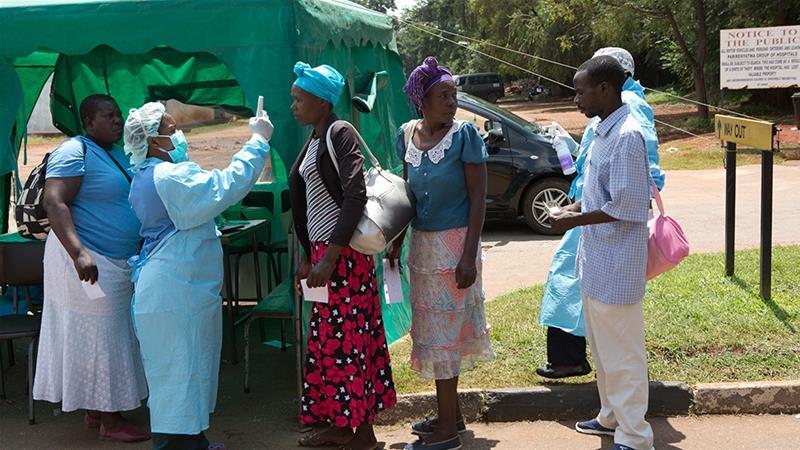Two-weeks off After Every Week of Work for Nurses in Zimbabwe

Health workers screen people visiting a public hospital in Harare, Zimbabwe [Tsvangirayi Mukwazhi/AP]
Starting from May 18 nurses in Zimbabwe’s public hospitals will have two weeks off after each week of work, in accordance with the agreement between unions and the government.
As per the agreement reached on May 13, the working shift on each day will be for eight hours. On returning to work after the two-weeks off following a week’s duty, nurses will be tested for COVID-19 since “usually one shows signs between two to 14 days,” Health Service Board’s chairperson, Paulinus Sikosakna said.
Due to extreme shortage of PPEs in Zimbabwe, nurses there are particularly vulnerable to contracting COVID-19. This puts not only their families at risk of infection but also other patients they treat.
This new arrangement seeks to mitigate the risk. The compromise was reached between unions and the government in the face of an imminent strike by nurses. Due to the economic crisis in the country, nurses have seen an erosion of over 85% in their real incomes, which has left them severely incapacitated.
Nurses claim that with their current salaries, they are unable to afford the cost of daily travel to work. Their salaries are around ZWL 1000-2000, which is about USD 40-80 according to the official exchange rate of 25 Zimbabwean dollars to a US dollar. Two years ago, prior to the de-dollarisation and introduction of a new unstable currency, the lowest paid nurses’ wage was equivalent to USD 284.
In order to minimise expenditure on travel to and from work, nurses were previously working under what was dubbed a “flexible working hours” system – an arrangement whereby nurses would take turns on 12-hour shifts for only two days a week.
This system was agreed upon in a collective bargaining agreement between the government and the nurses’ unions following an indefinite strike by nurses earlier this year. The arrangement was to “be in place until there was an adequate review of remuneration,” as per Enock Dongo, the general secretary of Zimbabwe Nurses Association (ZINA).
However, without consulting the nurses unions, the government, following a cabinet meeting on May 6, announced that it will renege on this agreement.
Monica Mutsvangwa, Minister of Information, Publicity and Broadcasting Services, said, “In order to ensure availability of staff at all health institutions, Government suspends the collective bargaining agreement on flexi-hours for the health sector given that the State, in the stimulus package, offered to waive taxation for all health workers for the next six months.”
The government had also announced certain tax concessions as part of its COVID-19 relief measures, However, as per Dongo, “Our current estimate is that the waived tax is quite negligible when compared to the soaring prices of basic goods to the extent that for some employees, the tax amount would not be enough to cover the cost of buying a bottle of cooking oil.”
He further pointed out that even under the previous “flexible hours” work regime when the nurses were working two-days a week in turns, the government was not able to provide them with sufficient Private Protective Equipment (PPEs). If all nurses reported to work on regular duty, the shortage in PPEs would be much greater.
Demanding a withdrawal of this directive scrapping flexible hours, ZINA issued a strike notice on May 11, warning that the nurses will down tools from May 13 if the government does not concede.
The notice also reminded the government that “section 104(4)(a) of the Labour Act (Chapter 28:01).. allows those in the essential services to resort to collective job action to avoid any occupational hazard, which poses an immediate threat to the health or safety of employees.”
The strike was averted after the government came to the negotiating table and agreed on May 13 to an alternative arrangement, whereby nurses would work for a week and then take two weeks off, during which they would stay in self-isolation.
This arrangement was first proposed at the beginning of this month by the Health Apex Council, a body representing the unions in the health sector, in a meeting with the government representatives.
“This will… (give) time to monitor health workers for any signs and symptoms they may develop as the incubation period of the virus is 14 days,” Douglas Chikobvu, the secretary general of Zimbabwe Professional Nurses Union (ZPNU) had said in an interview to the Daily News on May 1.
After suspending the planned strike following the agreement on May 13, Dongo, who also heads the Health Apex Council, said in a statement: “That almost translates to our formula of two days a week. So, we have shelved the strike because fewer nurses will attend work at a time and avoid crowding. This also means they will use the few personal protective equipment (PPEs) available. To us, the government has… (withdrawn) their earlier directive to cancel Flexi hours. We have understood that because we are in a crisis, we had to reciprocate as well.”
However, he also clarified that the withdrawal of the strike action does not indicate that the dispute over salaries is over. Nurses continue to demand that their salaries should be fixed at an interbank exchange rate equivalent to USD 1,000.
Get the latest reports & analysis with people's perspective on Protests, movements & deep analytical videos, discussions of the current affairs in your Telegram app. Subscribe to NewsClick's Telegram channel & get Real-Time updates on stories, as they get published on our website.
























